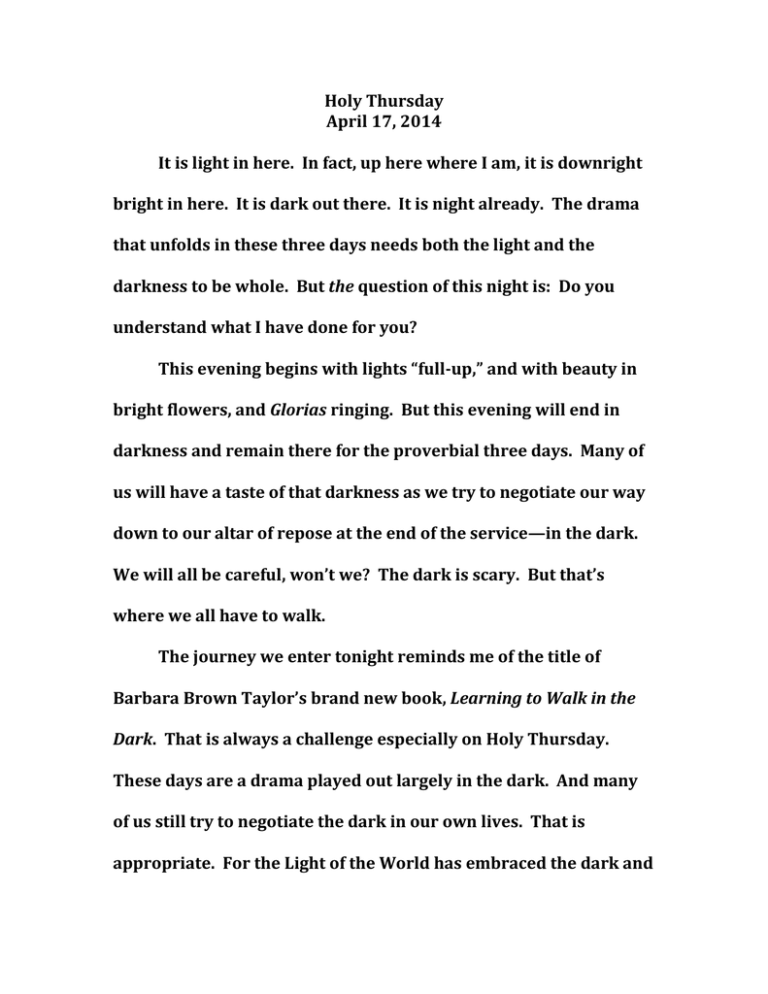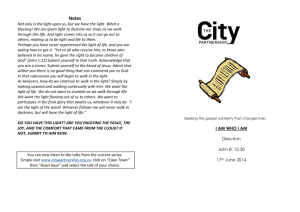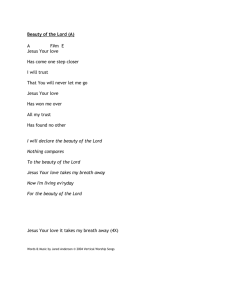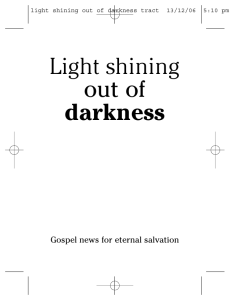Holy Thursday April 17, 2014
advertisement

Holy Thursday April 17, 2014 It is light in here. In fact, up here where I am, it is downright bright in here. It is dark out there. It is night already. The drama that unfolds in these three days needs both the light and the darkness to be whole. But the question of this night is: Do you understand what I have done for you? This evening begins with lights “full-up,” and with beauty in bright flowers, and Glorias ringing. But this evening will end in darkness and remain there for the proverbial three days. Many of us will have a taste of that darkness as we try to negotiate our way down to our altar of repose at the end of the service—in the dark. We will all be careful, won’t we? The dark is scary. But that’s where we all have to walk. The journey we enter tonight reminds me of the title of Barbara Brown Taylor’s brand new book, Learning to Walk in the Dark. That is always a challenge especially on Holy Thursday. These days are a drama played out largely in the dark. And many of us still try to negotiate the dark in our own lives. That is appropriate. For the Light of the World has embraced the dark and released its power. But we walk in the dark until the Great Vigil brings light back. But before the supper ends, before the light is extinguished, he asks them and us a question. “Do you realize, do you understand, what I have done for you?” It is a powerful question, perhaps one of the most profound questions Jesus ever asks in the gospels. Voltaire once said, “judge persons more by the questions they ask than the answers they give.” In all the gospels, Jesus doesn’t get to ask too many questions. Some of the ones he does ask are more trivial and circumstantial. But then there are the others. Listen to some of his questions. And maybe even ask them of yourself tonight. What are you looking for (Jn 1:38)? Who is it you are seeking (Jn 20:15)? What is it you want (Mt 20:21)? What do you want me to do for you (Mk 10: 51)? Why is it you call me ‘Lord, Lord’ and do not do what I say (Lk 6:46)? Then there are some other questions where there is even deeper import. My God, my God, why have you forsaken me (Mt 2 27:46)? Who do people say the Son of Man is? And the related question, who do you say I am? Ask yourself his questions: what are you looking for? What do you want of him? How is it that it is so easy to call Him Lord, Lord and still not do what he asks? And what does he ask tonight? Watch as we wash feet, break bread, and share a cup together. Then hear him ask again: Do you realize (understand) what I have done for you? Don’t answer too quickly. Remember that on that first night, no one did understand. Remember those who thought they could see from the gospel two weeks ago. The man born blind was the only one who in the end did see. T. S. Eliot penned a remarkable description of the paradox of Jesus. He speaks of Him as “the hint half-guessed, the gift only half-understood.” This Triduum is filled with the paradox of Jesus. We are a strange group who profess to follow Him. We are perhaps the only religious group in history that still celebrates its own disintegration. Timothy Radcliffe puts it this way: this night “is a story which tells of the moment when there was no story to tell, when the future disappeared. And “we gather as a community 3 around the altar and remember the night that the community disintegrated….Our community looks back to when it fell apart.” God was about to be abandoned and die in order to re-start creation from the beginning and in order to show again just how much God loves this world and all its desires and dreams. My brothers and sisters don’t ask me to explain it. I can’t. But we can’t forget that this is what happened. And no matter what is looks and feels like right now in our lives, God has already shattered even death itself. That is the Promise we remember this night. Do you understand what I have done for you? Answer slowly. It still seems incredible, and someday soon each of us will be invited again to live the answer we give. 4








